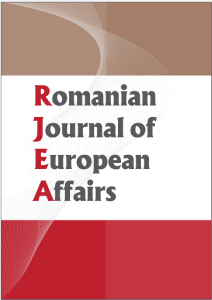In the winter issue of the Romanian Journal of European Affairs, the contributors bring to our attention several topics such as: the forgotten lessons of the German Reunification and the ways they could relaunch the European Union project; the EU external migration policy; the nature of the EU-Asia Pacific trade relations; the comparative analysis of the participation of Austria and Hungary in the EU Framework Programmes for Research and Technological Development; the climate policy of the EU and the expectations from the Paris Agreement.
The Lost and Forgotten Lesson of German Reunification and How It Can Relaunch the European Union Project
Florin Bonciu
Abstract:
The European Union has confronted, particularly in the past decade, with a diminishing position in the world economy in nominal terms (as percentage of world GDP), a decline of its global competitiveness and an increase in the diversity of the situations that cause troubles to its member states and regions that went far beyond the possibility of being efficiently managed by a single set of rules. Unfortunately, this growing diversity of situations, correlated with the increase of the inequality phenomenon in the developed countries, has been met by the European institutions with a more and more rigid framework that attempted to apply the principle “one size fits all” to a reality fundamentally characterized by diversity. This paper draws a parallel between the European Union’s attempt to assist its member states and regions in reducing development gaps and the German reunification process after 1990 by suggesting a master plan that might relaunch the European Union’s project, with a large support of the European citizens and along with that solving issues like economic growth and unemployment. The proposal starts from the German reunification lesson that was based on a massive financial intervention, correlated with a well-defined master plan that has been implemented with German rigor. At the same time, the proposal takes into account the economic projects that already exist in the European Union (particularly regarding infrastructure), as well as the low cost of money that characterizes the current international situation.
Keywords: European Union existential crisis, European Union relaunch, German reunification lesson
Migration Drivers, the EU External Migration Policy and Crisis Management
Fulvio Attinà
Abstract:
The present paper is a study of the response of the EU institutions and leaders to the inflow of irregular migrants from 2011 to 2016. The first section is the synthetic presentation of the migration drivers of our times at the global and local level. In section two, the citizens’ perception of the migrants as a threat is briefly discussed, and the border control and immigration policies of the EU are reviewed. In section three, the ‘Trans boundary crisis management’ model opted for analysing the EU migration crisis management is presented. Section four presents the analysis of the four scenarios of the European management of the current migration crisis. In the concluding section, the results of the analysis are summarily discussed. The analysis demonstrates that the EU leaders have been late in detecting the characteristics of the phenomenon and have not conceded to reconcile their conventional view to the features of the current migration. They have been unable to make response decisions well timed and acceptable to all. Lastly, they have been unable to stand firm on those management decisions they agreed on with difficulty and failed to formulate a shared message about the crisis and communicate credible messages to citizens about their ability to manage it.
Keywords: migration, crisis management, border control, immigration policy, European Union
European Union – Asia-Pacific Trade Relations: Tentative Bilateralism amidst Competing Plurilateral Initiatives
Beatriz Pérez de las Heras
Abstract:
This paper analyses major current trends in EU trade policy and their impact on the Asia-Pacific region. It explains how after being a guardian of multilateralism for many years, the EU is currently negotiating bilateral Free Trade Agreements with countries in the area while important and competing trade initiatives are also emerging amongst these nations. The fact that the EU is not a party to any of these plurilateral projects jeopardises its goal of becoming an active player in this challenging geopolitical landscape. Moreover, the political conditionality linked to EU trade diplomacy is generally not welcomed by these countries, which are becoming increasingly more economically and politically assertive. The divergent trade agendas of Member States further complicate any joint EU policy in the region. In light of these factors, political conditionality needs to be revised to provide more flexibility to global dialogue with these countries and a genuinely common trade strategy must be defined for the EU to leverage more effective influence and involve itself in regional integration deals in Asia-Pacific.
Keywords: bilateralism, free trade agreements, political conditionality, plurilateral initiatives, regional integration
The Participation of Austria and Hungary in the Framework Programmes for Research and Technological Development of the European Union. A Comparative Analysis
Ágota Dávid
Abstract:
The significance of the framework programmes for research and technological development of the European Union is constantly increasing. Horizon 2020, the Eighth Framework Programme with its 80 billion euro budget is a very important player in science funding. At the same time, due to the economic crisis and limited state budget for research and technology, national governments gladly encourage their scientists to apply for funds on the European level. Especially if they want to cooperate and carry out research internationally. So, as a surprising result, increasing amounts for funding result in more fierce competition. How do new and old Member States perform in this competition? The study will show this through the example of the performance of one old Member State – Austria – and one new Member State – Hungary. In the paper, first the history of framework programmes will be summarised, then the analysis of STI statistics about participation, success rates and financial contribution in retained proposals will follow. The difference in success rates might derive from various factors, including public and business expenditure on R&D, number of researchers, governmental support schemes or the more active involvement of innovative small and medium-sized enterprises.
Keywords: research and development, Horizon 2020, 7th Framework Programme, research funding
Climate Policy of the European Union: What to Expect from the Paris Agreement?
Wadim Strielkowski, Evgeny Lisin, Inna Gryshova
Abstract:
Our paper aims at evaluating the provisions of the EU climate change and policies to reduce greenhouse gas emissions as well as articulating the EU’s position with regard to sustainable development. In particular, we analyse the provisions and the outcomes stemming from the UN Convention on Climate Change (so-called “Paris Agreement”) held in France, last December.
Our results show that Paris Agreement sets a reasonable path to follow for the EU’s climate policy and bridges current climate policies and climate-neutrality prior to the end of the century. We conclude that if the Paris Agreement had not been signed, there would be a clear and urgent need for the similar binding framework that would shape up the European climate strategy in the face of the new political and economic changes facing Europe. Moreover, we stress the importance of the provisions emerging from the Paris Agreement for the existing EU Member States as well as for the countries aspiring to become EU members.
Keywords: energy policy, sustainable development, emissions, renewables, Paris Agreement, European Union






